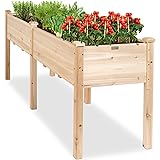SnugNiture Galvanized Raised Garden Bed Outdoor, 2 Pcs 4x2x1ft Oval Metal Planter Box for Planting Plants Vegetables, Brown
$55.99 (as of 14:17 GMT -05:00 - More infoProduct prices and availability are accurate as of the date/time indicated and are subject to change. Any price and availability information displayed on [relevant Amazon Site(s), as applicable] at the time of purchase will apply to the purchase of this product.)Best Choice Products 72x23x30in Raised Garden Bed, Elevated Wood Planter Box Stand for Backyard, Patio, Balcony w/Divider Panel, 6 Legs, 300lb Capacity - Natural
17% OffComposting is a simple and effective way to reduce food waste while creating nutrient-rich fertilizer for your garden. In this article, we’ll explore the basics of composting, how to start a compost pile, tips for adding the right ingredients to your compost pile, and using compost as fertilizer in your garden.

The Basics of Composting: What You Need to Know
Composting is the process of breaking down organic matter such as food scraps, leaves, grass clippings, and other yard waste into a rich soil amendment called compost. To get started with composting, you will need three things: brown material (such as dried leaves or shredded paper), green material (such as fresh vegetable scraps or lawn clippings), and water.
To create an ideal environment for composting, you should aim to maintain a balance between these two types of materials. Brown materials provide carbon, which helps to regulate moisture levels and provides structure for airflow within the pile. Green materials provide nitrogen, which fuels the decomposition process by providing energy for microorganisms that break down the material.
How to Start a Compost Pile and Keep it Healthy
Once you have gathered your materials, you can begin building your compost pile. Here are some steps to follow:
1. Choose a location for your compost pile that receives sunlight but is also sheltered from wind.
2. Clear the area of any debris or plants.
3. Create a base layer of twigs, sticks, or small branches to allow for aeration and drainage.
4. Add a layer of browns followed by a layer of greens until you reach the desired height of your pile.
5. Water the pile thoroughly, making sure not to overwater.
6. Repeat layers 4-5 until you have used all of your materials.
7. Cover the top of the pile loosely with a tarp or plastic sheet to keep out rain and prevent animals from getting inside.
Tips for Adding the Right Ingredients to Your Compost Pile
There are several ways to add variety to your compost pile and ensure that it stays healthy. Some tips include:
1. Mix up the ratio of browns and greens to maintain a balanced composition.
2. Chop or shred materials before adding them to the pile to increase surface area and speed up decomposition.
3. Add different types of materials, including fruit and veggie scraps, eggshells, coffee grounds, and even animal manure.
4. Turn the pile regularly to aerate it and distribute moisture evenly throughout.
Using Compost as Fertilizer in Your Garden
After several months of patient waiting, your compost pile will be ready to use as fertilizer in your garden. Here are some benefits of using compost instead of synthetic fertilizers:
1. Compost improves soil health by increasing its ability to retain moisture and nutrients.
2. It reduces erosion and runoff, helping to protect local watersheds.
3. It promotes plant growth and increases yields.
4. It contains beneficial bacteria and fungi that help to improve soil biology.
In conclusion, composting is a fun and rewarding hobby that can benefit both your wallet and the environment. By following these basic guidelines, you too can turn food waste into nutritious fertilizer for your garden.
Related Content
- Organic gardening tips-4 tips for conscious gardeners
- Everything you need to know about composting, from bins to benefits
- Introducing Compo Soil: The World’s First Food Waste Compost… | MENAFN.COM
- Why Interplanting Herbs Is BETTER Than Growing An Herb Garden
- How to Start Your Own Vegetable Garden: A Beginner’s Guide














































